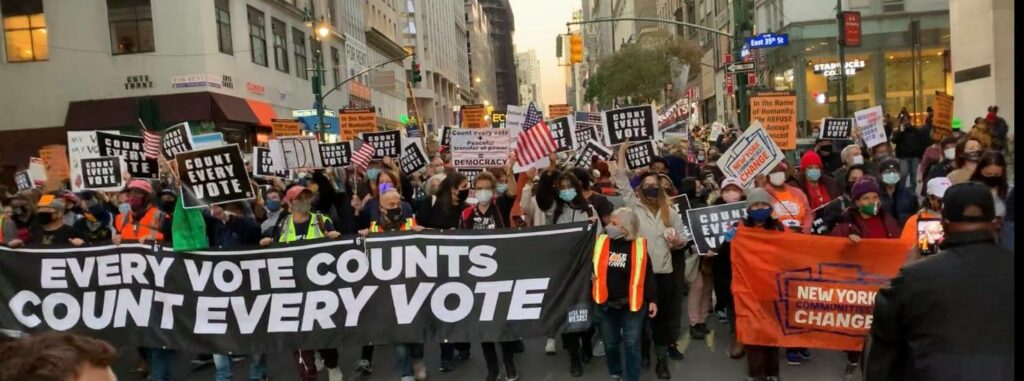#7: Lift each other up, do the next right thing
I’ve talked to and heard from so many people over the past 24 hours about what happened in the election. The mood has generally been grim, both because polling errors raised our expectations and because we hoped for a more resounding victory against racism, misogyny and cruelty than the win we got. We undoubtedly have a lot of reflection to do over the mid- to long-term about the meaning of the election results, but some thoughts for right now:
Defeating populist authoritarians at the ballot box is always hard, even unusual, especially in the present historical conjuncture. And yet, right now, I feel confident in saying that Donald Trump was in fact defeated. He lost the popular vote by a very large margin, and the margins in key states that decide the Electoral College, while close, are not in doubt. In the context of how hard authoritarians are to displace once they take power, this is a monumental win. It is a testament to the power of the people’s organizations and movements that set to work right after Trump was inaugurated and never stopped. Not all victories, in my experience, feel good to the people who win them when they win them. But let’s not let the clouds obscure the sun, or the significance of what was accomplished. In this authoritarian era, Modi won (twice!), Johnson won, Bolsonaro won, Putin “won,” Orban won, Duterte won. Yes, Trump won, but then Trump LOST. Because of us. The fact that we will NOT continue a slide into authoritarianism – that we won some precious time to breathe, organize and reset – is a very, very big deal.
The victory needs to be defended. We must protect the results and make sure that we count every vote. I was shocked to see Fox News subdued on election night, calling Arizona early for Biden, and even, in a few moments, scolding the President in a “fair and balanced” way for prematurely claiming victory. That’s a good sign about how some portion of our corporate overlords have decided to play their hand. A Biden Presidency, even more so if it is constrained by Mitch McConnell and a hostile Supreme Court, is not likely to be bad for business or Wall Street (and you can tell they think that by how financial markets have responded).
Even so, we should, in my opinion, which I know is not universally shared, mobilize non-violently to show that there is people power behind this win, power that is prepared to joyously defend it, to demonstrate that we are confident and not cowed. Donald Trump and his fleet of lawyers don’t decide who won – we the people decide who won. The doleful sentiment in many progressive circles – behaving as though we’ve lost – could become a self-fulfilling prophecy if we don’t find our game face. Nothing is certain until the electoral vote count is certified by the new Congress in January. We must remain mobilized, confident, and engaged.
It is not 100% certain at this writing that the Republicans will win the Senate. If it comes down to two Senate seats in a special election in Georgia in January, we should do all we can to support the extraordinary, visionary Black leadership in that state that has made so much progress already to finish the job they have started. It will be hard – but it can be done.
Governing will be very hard, even if Republicans don’t end up controlling the Senate, but we have opportunities in front of us. The risk is obvious – that a Biden administration will be left with accountability for manifold economic and health crises without the power to fully redress them, and that a fierce institutional resistance from not only the Senate and the Supreme Court, but also an emboldened, grassroots Trumpian resistance will sabotage all progress. However, there are things Democrats can win in Congressional negotiations, ways that the bully pulpit of the Presidency can be used to build popular support and change the narrative, and as Stephen Miller, the evil force behind Trump’s immigration agenda, showed, many things a mobilized federal executive branch can accomplish. Democrats have not recently been skilled at this kind of work to use government to alter relations of power – but they can be pushed and taught to do it. If they do it right, this will set up the 2022 midterms (with a more favorable Senate map) that produce bigger Democratic majorities in Congress. Much more to say on this topic of governing for power – but that’s for another time.
Change in Washington never comes from people in Washington. Change comes from mobilized social movements. If millions of people facing hardship, racial injustice, evictions, and joblessness take action, that will create cascading pressures upwards that force action from elites and policymakers. This is the real history of what produced the Great Society and the New Deal revolutions in social policy, once you correct for the elite bias that pervades most historical narratives. Organizations can’t produce those kinds of movements, but they can fan the flames of movement. And this has been a golden age of social movements. We shouldn’t feel defeated by the constraints of narrow margins in Congress – we should feel emboldened to build grassroots movements that make the impossible possible. That’s always how we win.
It has been clear to many of us from the beginning that Trump is not an aberration who beamed to America from Mars. Rather, he is a mirror for the deep racism, misogyny and cruelty bred in the bone of American society and culture. The reality that millions more people voted for Trump in 2020, knowing who he is and what he has done, is hard to take – for people of color, especially – even if it is not surprising. My working-class students of color at CUNY were not at all surprised by Trump’s political success, and most of them thought it likely that he would win again, even when the polls showed otherwise. They know America better than most of the pundits do. I don’t think this profound, painful reality about who we are is subject to any quick fixes, including the electoral “treatments” or issue “messaging” that are so in vogue these days or to happy talk about “reconciliation” and “healing” in the absence of truth or justice or repair. No shortcuts. As Perry Anderson put it, “A resistance that dispenses with consolations is always stronger than one that relies on them.”
I don’t plan on questioning any of my values or political commitments as a result of this election – quite the contrary: I’m doubling down. But I do plan to bring some humility and open-mindedness to the question of what paths we can pursue to best achieve them. I hope that we all look at the evidence over the next few months not as a way of confirming our own pre-existing narratives and strategies but as an invitation to disrupt them and think freshly and imaginatively about the path forward.
But that reflection is probably not a task for the next few days and weeks. In the meantime, so close to a big, important, historic, monumental victory – let’s push it over the line, insist that we count every vote, and – yes – appreciate, honor and celebrate all the millions of people – especially those working class people of color in Detroit, Milwaukee, Phoenix, Philly, Vegas and elsewhere who once again saved the country from its worst impulses. Knocking on doors in Philly, having challenging conversations with understandably skeptical prospective voters, I had a moment where I felt viscerally connected in a web with millions of people who were doing some version of that same thing – pouring bodies and souls into the historically crucial project of confining a narcissist, racist, misogynist, would-be authoritarian to the dustbin of history. And, friends, we’ve almost done that. So let’s lift each other up, get some rest, care for each other, and do the next right thing.
Deepak Bhargava is Distinguished Lecturer at the CUNY CUNY School of Labor and Urban Studies and the former Executive Director of Community Change.

